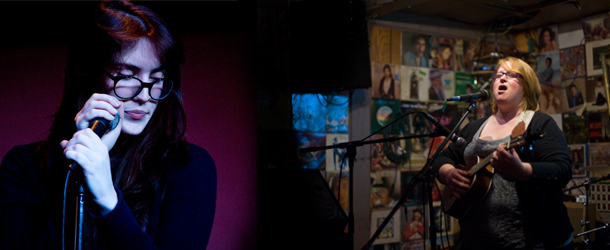"… You walk into a practice space with all these long-haired dudes sitting on the floor, thinking, 'Whose slut are you?'"
By Hilary Stohs-Krause
"It's pretty intimidating to play with 40 other dudes on a 12-band bill," said Julia Kugel, lead singer and guitarist with the Coathangers, in a 2008 interview. "Or when you walk into a practice space with all these long-haired dudes sitting on the floor, thinking, 'Whose slut are you?' "But you just do it because you know you deserve it."
Female musicians can face some tough shit. Their projects are derived as "chick bands" or "girl groups." The term "all-female band" even has its own Wikipedia page, as though the idea of women making music together is something bizarre that needs explaining. (There is no "all-male band" page.)
When it comes to the dinner of music appreciation, women aren't just regulated to the worst spots — more often than not, they're forced to crawl on the floor, begging for crumbs, or jump on the table and start smashing plates to make themselves noticed. This space will be a forum for all topics having to do with women, music and Nebraska, including artist profiles, interviews, show previews, podcasts and feature stories. Because at least when it comes to music, exposure for women is a very good thing.
Rolling Stone Magazine's 2004 list of the 100 greatest artists of all time included exactly nine women or groups with a female member: Tina Turner, Etta Tames, the Shirelles, Martha and the Vandellas, Diana Ross and the Supremes, Aretha Franklin, The Velvet Underground, Joni Mitchell and Madonna. Franklin was the only woman in the Top 10. Kaki King is the only woman to make the same mag's list of the 100 greatest guitarists. You could say it's simply Rolling Stone that's behind the times, but it's an industry-wide failure.
"Let's talk about the problem first and explore that," King told me in an interview two years ago. "How are we as women or as a society suffering from that? … Does it mean we're not allowed to express ourselves as much and therefore our voice is being diminished, whether it's our literal voice or our musical voice?
"And it's not just music, it's everything," she continued. "It's music, it's science … girls are so great at everything until they hit seventh or eighth grade and it all falls apart. And why is that? It's very complicated and confusing."
Interviews with dozens of female musicians have revealed the same problems, from Lady Gaga to Joli Holland to Omaha's Tilly and the Wall. King said that "50 percent" of the time, male airport employees ask her to "Play a song, sweetie" when they scan her guitar through the X-ray. "The first few times I thought it was cute, but then it was like, you know what? Fuck you," she said.
"It's like the random musical airport equivalent of getting a catcall." Kianna Alarid of Tilly and the Wall said in a 2008 interview. "There's a club in St. Louis called the Creepy Crawl that we'll never play again because of the way we were treated by the men there. It just sucks. We're just trying to do our job.
"There are tons of negative examples that I'm sure every girl can relate to. There're a lot of guys out there who work at clubs who will treat you poorly … Some of them are like extra flirty, and I think even that's offensive," she continued. "This is a profession, we're professionals here, this is our job."
King echoed her frustrations. "It can be a very disgusting thing, the objectification," she said. "But that never changes for women, no matter what industry you're in. It just comes down to female development within society and what gets encouraged and what gets discouraged."
Coathangers' Kugel encouraged other women musicians to ignore the criticism: "Try not to listen to what other people say, because everyone deserves a voice and deserves to make something and put it out there."
Alarid said it is getting better, slowly but surely. "I think (the discrimination) is changing, and that's all we can ask for. Well, we can ask for a lot, but that's all we can expect."
And within Nebraska, it seems, the community is much more respectful and welcoming, which is perhaps evident by the surge of women musicians and bands making a name for themselves in the last few years, from Saddle Creek Records' The Mynabirds, UUVVWWZ and Land of Talk to Omaha's All Young Girls Are Machine Guns and Honey & Darling to Lincoln's Gloworm and Irkutsk.
"Locally? Locally, so many!" responds AYGAMG's Rebecca Lowry when asked which women musicians in the state have influenced her. She called recent Omaha-to-Austin transplant Cass Fifty "the Janis" of Nebraska and Lincoln group The Betties "so fantastic."
Tilly's Alarid said she's never noticed being treated differently in Nebraska. "I will say that the music scene here is totally supportive of us," she said. "I mean, you hear things every now and then, but that kind of stuff doesn't really matter. People who do support you support you 100 percent. That's just how Omaha is."
For more, you can also tune into the X-Rated: Women in Music radio show every Thursday from 1:05 to 3 p.m. CST at 89.3FM KZUM in Lincoln or streaming live at http://kzum.org. Or, if tumblr is more your style, check out xmusic.tumblr.com.




